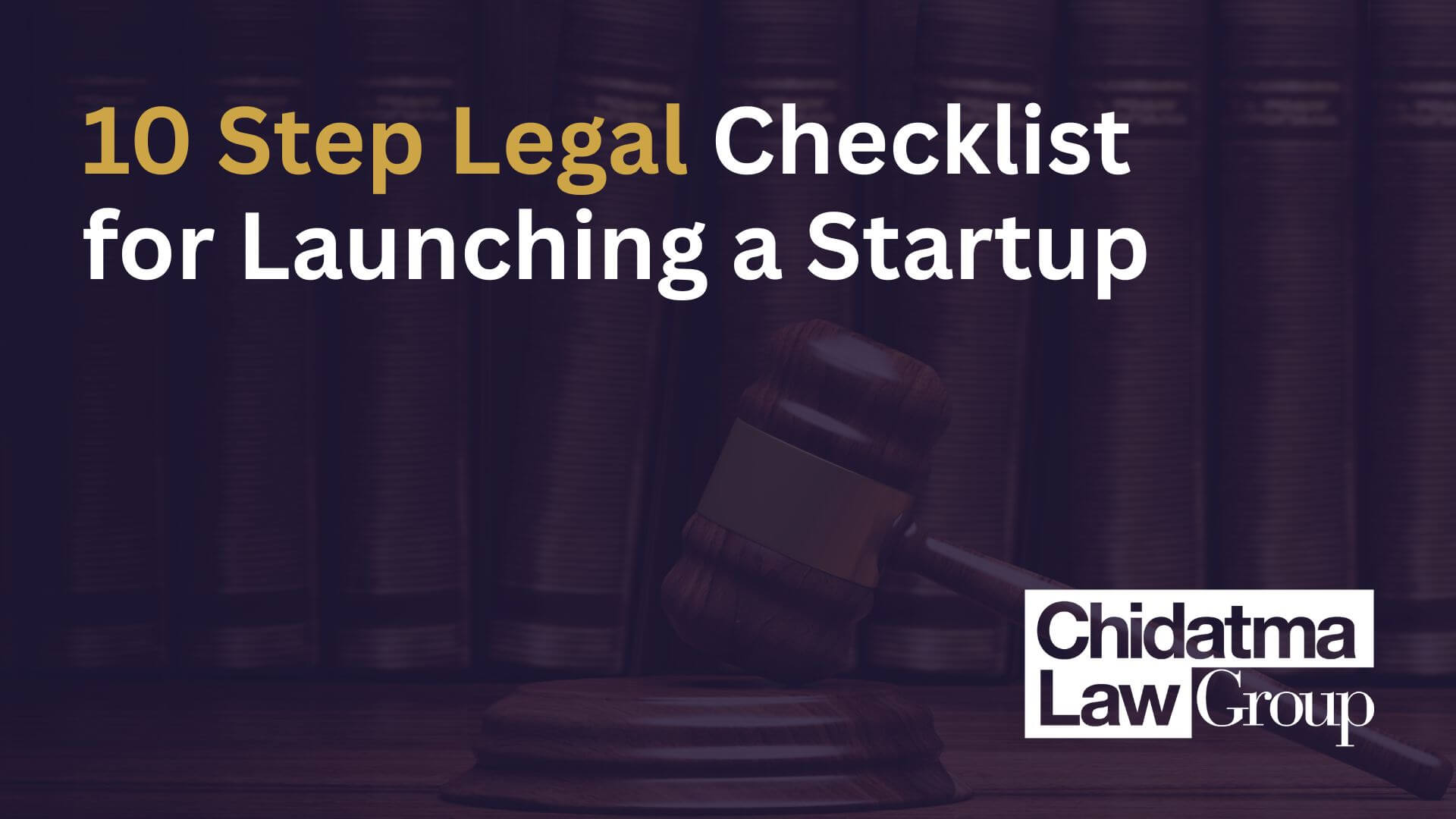
So, you’ve got that million-dollar idea brewing, the passion is ignited, and you’re ready to dive headfirst into the exciting world of startups. Before you start popping the champagne and designing your corner office, there are a few important legal boxes you need to tick.
At Chidatma Law Group, we understand the exhilarating chaos of launching a startup. We’ve guided countless entrepreneurs through these early stages, providing the insightful counsel needed to navigate the legalities of the startup process without losing their entrepreneurial spark. We’ve seen what works, what doesn’t, and how proactive legal planning can be the secret sauce to long-term success. Let us help you lay that strong foundation.
Your New York Startup Business Checklist
Here’s your 10-step legal checklist to get your startup off the ground the right way!
1. Choosing Your Business Structure: The Foundation of Everything
Sole proprietorship, partnership, LLC, S-corp, C-corp – the alphabet soup of business structures can feel overwhelming. Each comes with its own set of legal and tax implications. Your choice here will impact your personal liability, how you file taxes, and even how you raise capital down the line.
- Sole Proprietorship: Simple to set up, but you and your business are legally the same entity, meaning your personal assets are at risk.
- Partnership: Two or more individuals agree to share in the profits or losses of a business. A well-drafted partnership agreement is crucial to avoid future disputes.
- Limited Liability Company (LLC): Offers a degree of separation between your personal assets and business debts, providing liability protection. It also offers flexibility in taxation.
- S-Corporation and C-Corporation: More complex structures are often chosen for specific tax advantages or when seeking significant investment.
We can walk you through the pros and cons of each structure in the context of your specific business goals and help you make the most informed decision. This initial choice has far-reaching legal consequences, and getting it right from the start can save you headaches (and money) later on.
2. Registering Your Business Name
You’ve got the perfect name – it’s catchy, memorable, and it perfectly captures your brand. Now, you need to make it official! This involves checking for availability with the New York State Department of State and then registering your chosen name.
- Name Availability Search: Ensure no other business in New York is already using your desired name.
- Filing Formation Documents: Depending on your chosen structure (e.g., Articles of Organization for an LLC, Certificate of Incorporation for a corporation), you’ll need to file specific documents with the state.
- DBA (Doing Business As): If you plan to operate under a name different from your legal business name, you’ll likely need to register a DBA.
We can streamline this process, ensuring all paperwork is filed correctly and on time, preventing potential delays or rejections. We can also advise you on trademark considerations to protect your brand identity beyond just the business name registration.
3. Securing Your Employer Identification Number (EIN)
If your business is anything other than a sole proprietorship without employees, you’ll need an EIN from the IRS. This nine-digit number is used to identify your business for tax purposes. The steps for this process are as follows:
- Applying to the IRS: The application process is generally straightforward, but accuracy is key.
- Using Your EIN: You’ll need your EIN to open a business bank account, hire employees, and file federal taxes.
4. Drafting Your Founding Documents: Setting the Rules of Engagement
Whether you have co-founders or are going solo, clear and comprehensive founding documents are essential. These lay out the ownership structure, responsibilities, decision-making processes, and what happens if things change down the line.
- Operating Agreement (for LLCs): This outlines the ownership percentages, management structure, profit and loss allocation, and procedures for adding or removing members.
- Shareholders’ Agreement (for Corporations): Similar to an operating agreement, but for corporations, detailing shareholder rights, voting procedures, and transfer restrictions.
- Partnership Agreement (for Partnerships): Crucial for defining each partner’s contributions, responsibilities, profit/loss sharing, and dispute resolution mechanisms.
5. Understanding and Protecting Your Intellectual Property
Your ideas, inventions, brand names, logos, and creative works are valuable assets. Protecting your intellectual property is crucial for maintaining a competitive edge.
- Trademarks: Protect your brand names, logos, and slogans.
- Copyrights: Protect your original works of authorship, such as website content, marketing materials, and software code.
- Patents: Protect your inventions (utility, design, or plant).
- Trade Secrets: Protect confidential information that gives your business a competitive advantage.
6. Navigating Contracts: The Building Blocks of Business Relationships
From vendor agreements to customer contracts, your startup will rely heavily on contracts. It’s important to have well-drafted agreements that clearly define the terms, obligations, and liabilities of all parties involved.
- Customer Agreements: Outline the terms of your products or services, payment terms, and warranties.
- Vendor Agreements: Govern your relationships with suppliers and service providers.
- Employment Agreements: Define the terms of employment for your hires.
- Non-Disclosure Agreements (NDAs): Protect confidential information shared with potential partners, investors, or employees.
7. Complying with Labor Laws
As you grow and hire employees, you’ll need to comply with a complex web of federal, state, and local labor laws.
- Wage and Hour Laws: Ensure you are paying employees correctly and adhering to minimum wage and overtime regulations.
- Anti-Discrimination Laws: Understand and comply with laws prohibiting discrimination based on protected characteristics.
- Employee Handbooks: Develop clear policies and procedures for your employees.
- Independent Contractor Agreements: Properly classify workers to avoid misclassification issues.
8. Understanding Data Privacy and Security
In today’s digital age, data privacy is paramount. You need to understand your obligations regarding the collection, storage, and use of personal data.
- Privacy Policies: Develop a clear and comprehensive privacy policy that informs users about how their data is collected and used.
- Data Security Measures: Implement reasonable security measures to protect user data from breaches.
- Compliance with Regulations: Be aware of relevant laws like the California Consumer Privacy Act (CCPA) and other state-specific regulations, especially if you have customers outside of New York.
9. Securing Necessary Licenses and Permits in New York
Depending on your industry, you’ll likely need to obtain specific licenses and permits to operate legally in New York City and New York State.
- General Business License: Many businesses in NYC require a general operating license.
- Industry-Specific Licenses: Certain industries, such as food service, healthcare, and finance, have specific licensing requirements.
- Zoning and Permits: Ensure your business operations comply with local zoning regulations and obtain any necessary building or operating permits.
10. Planning for the Future: Growth and Beyond
While you’re focused on the initial launch, it’s wise to think ahead. Consider potential future needs such as fundraising, scaling your operations, and even potential exit strategies.
- Investment Agreements: Understand the legal implications of taking on investors.
- Equity and Stock Options: If you plan to offer equity to employees or advisors, ensure you have the proper legal framework in place.
- Exit Strategies: While it might seem far off, having a basic understanding of potential exit options (acquisition, IPO) can inform your legal decisions early on.
Contact Us Today
Launching a startup in NYC is an exciting endeavor. By tackling these 10 legal steps early on, you’ll be building a strong and secure foundation for your business to thrive.
The business law attorneys at Chidatma Law Group in New York City are here to provide the guidance and support you need to turn your startup dreams into a successful reality. Contact us today to learn how we can help you navigate these crucial steps and set your business up for long-term success!

